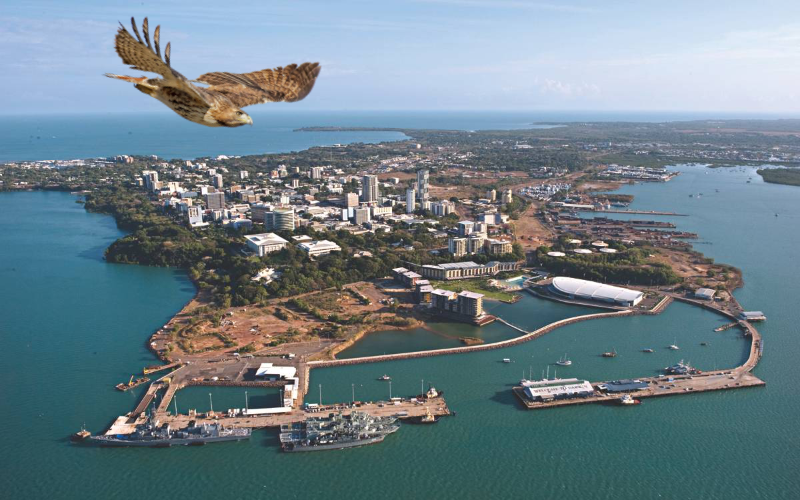Albanese Government Moves to Remove Chinese Ownership from Port of Darwin
Government pushes forward despite no proven national security risk
The Albanese government appears to be fulfilling its promise to remove Chinese company Landbridge from the Port of Darwin—an effort that underscores its intent to outmaneuver opposition pressure on national security. Despite no proven risk posed by the current ownership, the political momentum toward change is gaining steam.
Defence ministers align amid rising concerns over China
Defence Minister Richard Marles has met with his US counterpart, Pete Hegseth, as both governments highlight concerns over China’s growing military influence. In the background, Australia is moving to reclaim the Port of Darwin—not by waiting for Landbridge to sell it, but by politically orchestrating its transfer of ownership.
Political motivations outweigh intelligence assessments
Labor’s promise during the federal election to remove Chinese ownership of strategic infrastructure was clearly designed to avoid being outflanked by the LNP on defence policy. There was no credible evidence to support the idea that Landbridge posed a threat. Still, public perception—and geopolitical tension—have fueled bipartisan resolve.
Former Defence leaders dismissed espionage concerns
Before Landbridge leased the port in 2015, Australian authorities and Defence conducted thorough reviews and cleared the deal. Air Chief Marshal Mark Binskin pointed out at the time that ship movements were publicly observable, making espionage concerns seem far-fetched.
Expert criticism highlights shift in national posture
Dennis Richardson, then secretary of Defence, even dismissed the spy narrative as “amateur hour.” Yet now, the same atmosphere of political suspicion is dictating Australia’s stance once again, with unclear direction about who should—or shouldn’t—own the asset.
US firm emerges as likely buyer amid ownership contradiction
Reports suggest that Cerberus Capital Management, a US-based private equity firm, may be the frontrunner to purchase the port. Curiously, this implies another foreign owner could control one of Australia’s strategic gateways—despite all the fuss about foreign interference.
Landbridge reportedly seeks nearly double original purchase price
Cerberus is preparing a formal bid, slightly above the $506 million that Landbridge paid a decade ago. However, some sources claim Landbridge wants close to $1 billion, raising the question: if the port truly had high strategic value to China, why would it be up for sale at all?
Cerberus’s military links spark conflict of interest concerns
Adding to the irony, Steve Feinberg, Cerberus’s co-founder, is also the current US Deputy Secretary of Defence. This raises ethical and strategic implications about how foreign interests—especially US military-linked entities—play into Australia’s national interest calculations.
US firm already invested in Australian defence assets
In November 2024, Cerberus invested $100 million in Cockatoo Island to support Australia’s oil and gas sector and provide military logistics support. Their track record reveals a consistent appetite for acquiring Australian strategic infrastructure.
PM prefers local ownership but leaves door open
Prime Minister Anthony Albanese stated a preference for the port to remain in “Australian hands,” but left the door open for other proposals. In fact, his statement only strengthens the irony, since the original lease to Landbridge was itself made on purely commercial terms.
Local investors reluctant to engage with the deal
The port isn’t exactly a hot-ticket item either. Analysts say few bidders are likely, with the price expected to exceed $800 million. Superannuation funds—Australia’s most likely local buyers—reportedly find the deal too complex and small to be attractive.
Defence Minister noncommittal on US ownership
Marles, despite Albanese’s preferences, has not ruled out US ownership. When asked during the Shangri-La Dialogue in Singapore whether US pressure influenced the decision, Marles pointed to the unsuitability of Chinese ownership without dismissing foreign ownership in general.
Vague rhetoric complicates national strategy narrative
He told Bloomberg, “We don’t think it is appropriate that [a] piece of infrastructure was in the hands of a Chinese publicly owned entity,” while avoiding any explicit opposition to future foreign ownership. In essence, his reply signals no preference for an Australian buyer—only for a non-Chinese one.
Leadership messaging sends mixed signals
This ambiguity conflicts with Albanese’s more assertive statement in which he emphasized sovereign decision-making in defence policy. He dismissed US Secretary of Defence Pete Hegseth’s proposal that Australia raise defence spending to 3.5% of GDP, reaffirming national autonomy.
Legal showdown looms as Landbridge stands firm
While these political skirmishes unfold, a bigger question looms: will Landbridge accept this forced transition, or will it fight back legally? After all, there’s no indication Landbridge breached its 99-year lease terms, approved by the Northern Territory and federal governments.
Compensation risks could fall on taxpayers
If this becomes a legal matter, taxpayers could be hit with millions in legal fees—and possibly hundreds of millions in compensation. Landbridge could argue that it was penalized despite meeting all contractual obligations, leaving the government exposed to costly litigation.
Port dispute reveals deeper tensions in sovereignty
Ultimately, this saga reflects the intersection of political expediency, foreign policy pressure, and economic interests. Whether the port ends up in Australian hands—or those of another military-linked foreign buyer—the broader implications for sovereignty and strategy remain unresolved.






